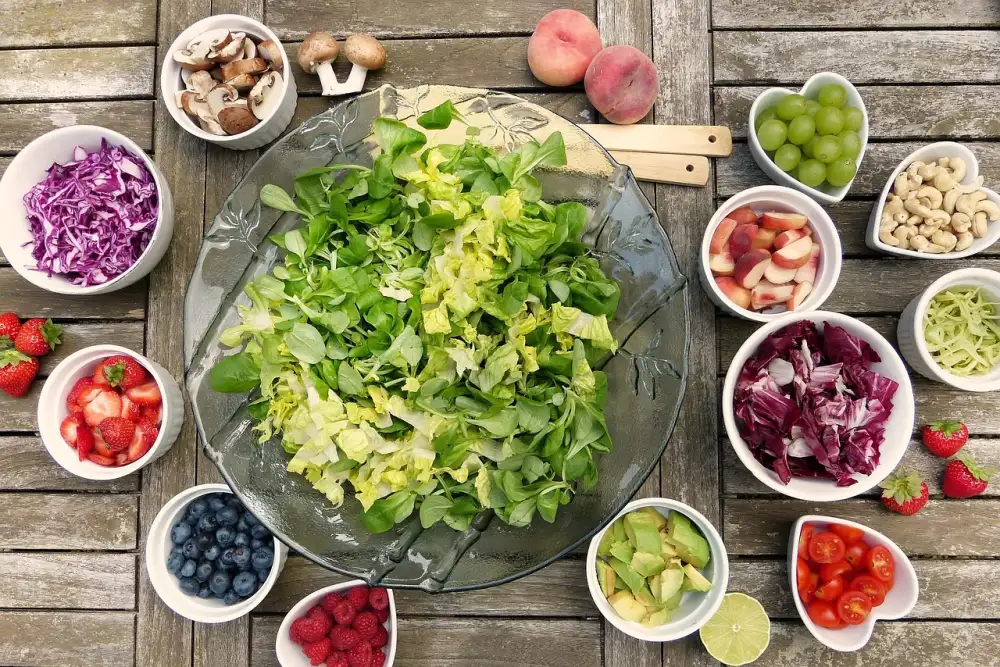Unleash Your Culinary Creativity with Egg Substitutes: Exciting Recipes for Egg-Free Cooking and Baking

- Benefits of Using Egg Substitutes in Cooking and Baking
- Common Types of Egg Substitutes
- Recipe: Vegan Egg Substitute using Flaxseed
- Recipe: Applesauce Egg Substitute for Baking
- Recipe: Silken Tofu Egg Substitute for Scrambled Eggs
- Recipe: Yogurt Egg Substitute for Binding
- Tips for Successfully Using Egg Substitutes in Recipes
Eggs are a staple ingredient in many recipes, providing structure, moisture, and richness to dishes. However, for those following a vegan or vegetarian diet, or for individuals with allergies or dietary restrictions, eggs may not be an option. That's where egg substitutes come in. These clever alternatives allow you to unleash your culinary creativity without compromising on taste or texture. In this article, we will explore the benefits of using egg substitutes in cooking and baking and share some exciting recipes that showcase their versatility. So let's dive in and discover the world of egg-free cooking!
Benefits of Using Egg Substitutes in Cooking and Baking
Using egg substitutes in cooking and baking offers numerous benefits. Firstly, it caters to dietary restrictions and preferences, making recipes suitable for vegans, those with egg allergies, or individuals following a plant-based diet. Secondly, egg substitutes can reduce the cholesterol and fat content of dishes, promoting healthier eating habits. Additionally, using egg substitutes can enhance the texture and moisture of baked goods while still providing structure and stability. Lastly, experimenting with different egg substitutes allows for culinary creativity and the opportunity to discover unique flavors and textures in your creations.
Common Types of Egg Substitutes
If you're looking to explore egg-free cooking and baking, there are several common types of egg substitutes that can help you achieve the same results. These substitutes not only provide the necessary binding and leavening properties of eggs but also add unique flavors and textures to your dishes. Here are some popular options:
1. Flaxseed: Ground flaxseed mixed with water creates a gel-like consistency similar to beaten eggs. This vegan-friendly substitute works well in baked goods like muffins and cookies.
2. Applesauce: Unsweetened applesauce adds moisture and sweetness to recipes, making it an excellent substitute for eggs in cakes, breads, and brownies.
3. Silken Tofu: Blended silken tofu creates a creamy texture that mimics scrambled eggs perfectly. It's a great option for savory dishes like breakfast burritos or tofu scrambles.
4. Yogurt: Plain yogurt can be used as an egg substitute for binding purposes in recipes such as meatballs or veggie burgers. Its tangy flavor adds a pleasant twist to the dish.
These are just a few examples of the many egg substitutes available in the culinary world. Experiment with different options to find the ones that best suit your taste preferences and dietary needs. Remember, each substitute may alter the final outcome slightly, so don't be afraid to get creative and adapt recipes accordingly!
Recipe: Vegan Egg Substitute using Flaxseed
Flaxseeds are a fantastic vegan alternative to eggs, packed with omega-3 fatty acids and fiber. Here's a simple recipe to create an egg substitute using flaxseeds:
Ingredients:
- 1 tablespoon ground flaxseeds
- 3 tablespoons water
Instructions:
1. In a small bowl, combine the ground flaxseeds and water.
2. Stir well until the mixture becomes thick and gelatinous, resembling the texture of beaten eggs.
3. Let the mixture sit for about 5 minutes to allow the flaxseeds to absorb the water and thicken further.
4. Use this vegan egg substitute in recipes that call for eggs, such as pancakes, muffins, or cookies.
The flaxseed egg substitute adds moisture and binding properties to your dishes, making them just as delicious and satisfying as traditional recipes. Plus, it's a healthier option that is cholesterol-free and suitable for those with egg allergies or dietary restrictions.
Experiment with different ratios of flaxseeds to water depending on your desired consistency. Remember that this substitute may add a slight nutty flavor to your dishes, which can enhance certain recipes like breads or granola bars.
So go ahead and give this vegan egg substitute a try in your next culinary adventure! It's an excellent way to unleash your creativity in the kitchen while embracing a plant-based lifestyle.
Recipe: Applesauce Egg Substitute for Baking
If you're looking for a healthy and delicious egg substitute for your baking recipes, look no further than applesauce. Not only does it add moisture and sweetness to your baked goods, but it also acts as a binding agent, making it the perfect replacement for eggs.
To use applesauce as an egg substitute, simply replace each egg with ¼ cup of unsweetened applesauce. Make sure to adjust the amount of sugar in your recipe accordingly, as the applesauce will add some sweetness.
Applesauce works particularly well in recipes like muffins, cakes, and cookies. It adds a subtle apple flavor that complements a variety of ingredients. Plus, it's a great way to sneak in some extra fruit into your baked treats.
When using applesauce as an egg substitute, keep in mind that it may affect the texture of your baked goods slightly. They may turn out slightly denser or moister than if you were using eggs. However, this can be easily remedied by adjusting other ingredients or baking times.
So next time you're craving some homemade goodies but don't have any eggs on hand or simply want to try something new, give the applesauce egg substitute a go. You'll be pleasantly surprised by the results!
Recipe: Silken Tofu Egg Substitute for Scrambled Eggs
Ingredients:
- 1/2 cup silken tofu
- 1 tablespoon nutritional yeast
- 1/4 teaspoon turmeric
- Salt and pepper to taste
Instructions:
1. In a small bowl, mash the silken tofu with a fork until it reaches a scrambled egg-like consistency.
2. Add the nutritional yeast, turmeric, salt, and pepper to the mashed tofu. Mix well to combine all the ingredients.
3. Heat a non-stick skillet over medium heat and lightly grease it with cooking spray or oil.
4. Pour the tofu mixture into the skillet and cook for about 5 minutes, stirring occasionally, until heated through and slightly golden.
5. Serve hot as a delicious alternative to traditional scrambled eggs.
Note: The turmeric gives the tofu scramble its yellow color, resembling real scrambled eggs. Feel free to add your favorite vegetables or spices to customize this recipe according to your taste preferences. Enjoy!
Recipe: Yogurt Egg Substitute for Binding
Yogurt is a versatile ingredient that can be used as a substitute for eggs when it comes to binding ingredients together in recipes. Whether you're making meatballs, veggie burgers, or even cookies, yogurt can provide the necessary moisture and cohesion without the need for eggs.
To make the yogurt egg substitute, simply combine ¼ cup of plain yogurt with 1 tablespoon of cornstarch. Whisk the mixture until it becomes smooth and creamy. This mixture can replace one egg in your recipe.
The yogurt adds moisture to the dish while the cornstarch helps to bind everything together. The result is a perfectly bound and delicious dish that is completely egg-free.
When using this yogurt egg substitute, keep in mind that it may add a slight tangy flavor to your dishes. This can work well in savory recipes but may not be ideal for sweet desserts. Experiment with different flavors of yogurt to find the best match for your recipe.
Try using this yogurt egg substitute in recipes like meatloaf, meatballs, or even falafel. It works particularly well in dishes where you want a moist and tender texture without the use of eggs.
So next time you find yourself out of eggs or looking for an alternative, give this yogurt egg substitute a try. You'll be amazed at how well it works as a binder and how it enhances the flavor of your dishes. Embrace the versatility of egg substitutes and unleash your culinary creativity!
Tips for Successfully Using Egg Substitutes in Recipes
Incorporating egg substitutes into your cooking and baking opens up a whole new world of possibilities. Whether you're following a vegan lifestyle, have dietary restrictions, or simply want to experiment with different flavors and textures, egg substitutes offer endless opportunities for creativity in the kitchen.
A World of Options
From flaxseed to applesauce, silken tofu to yogurt, there are numerous options available that can mimic the binding, leavening, and moisture properties of eggs. These substitutes not only provide a healthier alternative but also add unique flavors and textures to your dishes.
Creative Culinary Explorations
By using egg substitutes, you can create delicious vegan pancakes, moist cakes, fluffy scrambled "eggs," and perfectly bound meatballs. The versatility of these alternatives allows you to explore various culinary creations without compromising taste or texture.
Tips for Using Egg Substitutes
- Follow the recommended measurements: When using egg substitutes, it's important to follow the suggested measurements provided in the recipe. This will ensure the right balance of ingredients and prevent any unwanted texture or taste changes.
- Experiment with different substitutes: Don't be afraid to try different egg substitutes to find the one that works best for your desired outcome. Each substitute has its own unique qualities, so experimenting will help you discover which one suits your recipe the most.
- Consider the flavor profile: Some egg substitutes may have a distinct flavor that can affect the overall taste of your dish. Take this into consideration when choosing a substitute and make adjustments accordingly to maintain the desired flavor balance.
- Adjust cooking time and temperature: In some cases, using egg substitutes may require adjustments in cooking time and temperature. Keep an eye on your dish while it's cooking and make necessary modifications to ensure proper doneness.
- Use binding agents: If your recipe requires eggs for binding purposes, consider adding additional binding agents such as breadcrumbs or cornstarch to compensate for any potential lack of cohesion caused by using egg substitutes.
- Incorporate leavening agents: For recipes that rely on eggs for leavening, such as cakes or muffins, add extra baking powder or baking soda to achieve a similar rise and texture without eggs.
- Be mindful of texture changes: Egg substitutes may alter the texture of your dish slightly. If you're looking for a specific texture (e.g., light and fluffy), choose an egg substitute that can mimic that consistency effectively.
- Read labels carefully: When purchasing pre-made egg substitutes from stores, read the labels carefully to ensure they are suitable for your dietary needs and preferences.
Unleash Your Culinary Creativity
So why limit yourself when it comes to cooking and baking? Embrace the versatility of egg substitutes and unleash your culinary creativity. Experiment with different recipes and discover new favorites that cater to your dietary needs or preferences.
Remember to adjust measurements accordingly when substituting eggs in recipes. It may take some trial and error to find the perfect balance, but don't be discouraged. With practice, you'll become more confident in using egg substitutes effectively.
So go ahead and explore the world of egg-free cooking and baking. Let your imagination run wild as you create delectable dishes that cater to all tastes and dietary requirements. With egg substitutes by your side, there's no limit to what you can achieve in the kitchen. Enjoy the journey of culinary discovery!
Published: 15. 01. 2024
Category: Food



